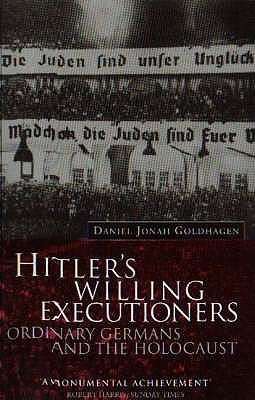
Hitler's Willing Executioners: Ordinary Germans and the Holocaust
Check my rate
| Main centres: | 1-3 business days |
| Regional areas: | 3-4 business days |
| Remote areas: | 3-5 business days |

| Main centres: | 1-3 business days |
| Regional areas: | 3-4 business days |
| Remote areas: | 3-5 business days |
Published by Little, Brown and Company, 1996, hardcover, index, 622 pages, condition: new/
, Hitler's Willing Executioners: Ordinary Germans and the Holocaust is a 1996 book by American writer Daniel Goldhagen, in which he argues collective guilt, that the vast majority of ordinary Germans were "willing executioners" in the Holocaust because of a unique and virulent "eliminationist antisemitism" in German political culture which had developed in the preceding centuries. Goldhagen argues that eliminationist antisemitism was the cornerstone of German national identity, was unique to Germany, and because of it ordinary German conscripts killed Jews willingly. Goldhagen asserts that this mentality grew out of medieval attitudes rooted in religion and was later secularized.
The book challenges several common ideas about the Holocaust that Goldhagen believes to be myths. These "myths" include the idea that most Germans did not know about the Hlocaust; that only the SS, and not average members of the Wehrmacht, participated in murdering Jews; and that genocidal antisemitism was a uniquely Nazi ideology without historical antecedents.
The book, which began as a Harvard doctoral dissertation, was written largely as an answer to Christopher Browning's 1992 book Ordinary Men: Reserve Police Battalion 101 and the Final Solution in Poland. Much of Goldhagen's book is concerned with the actions of the same Reserve Battalion 101 of the Nazi German Ordnungspolizei and his narrative challenges numerous aspects of Browning's book. Goldhagen had already indicated his opposition to Browning's thesis in a review of Ordinary Men in the July 13, 1992, edition of The New Republic titled "The Evil of Banality". His doctoral dissertation, The Nazi Executioners: A Study of Their Behavior and the Causation of Genocide, won the American Political Science Association's 1994 Gabriel A. Almond Award for the best dissertation in the field of comparative politics.
In a work that is as authoritative as it is explosive, Goldhagen forces us to revisit and reconsider our understanding of the Holocaust and its perpetrators, demanding a fundamental revision in our thinking of the years between 1933-1945. Drawing principally on materials either unexplored or neglected by previous scholars, Goldhagen marshals new, disquieting primary evidence that explains why, when Hitler conceived of the "final solution" he was able to enlist vast numbers of willing Germans to carry it out. A book sure to provoke new discussion and intense debate.